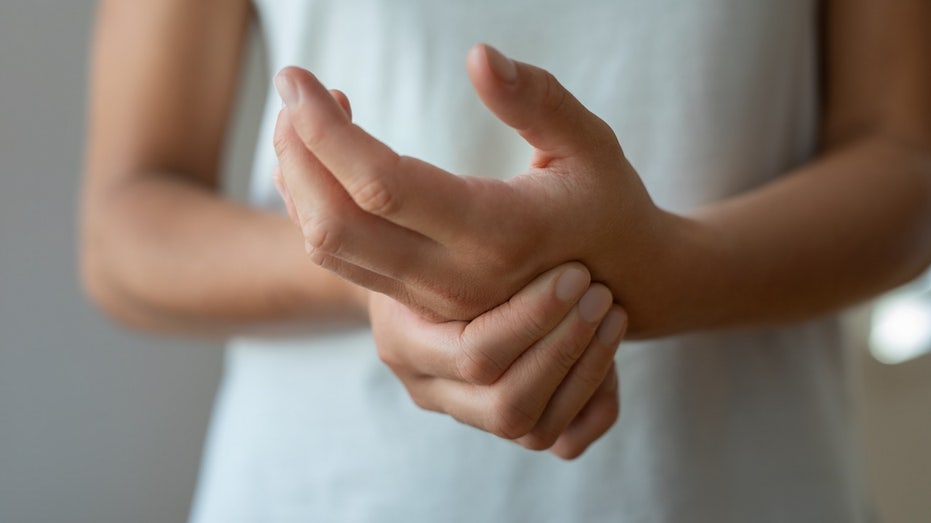If you notice your hands are swelling, it could be both uncomfortable and unsettling, but in most instances the cause could be situational — caused by factors such as temperature, exercise, diet, medications you’re taking or certain health conditions.
You may notice your rings aren’t fitting correctly, among other things.
To find out more about the condition, Fox News Digital asked two doctors what causes hand swelling and what can be done to treat it.
ASK A DOCTOR: ‘WHY AM I HEARING MY HEARTBEAT IN MY EARS?’
Here’s what you need to know.
Most commonly, hand swelling is due to fluid buildup in the soft tissue.
“Soft tissue swelling, or edema, is not always a cause for concern, and can occur with weather changes or fluid shifts in the body,” said Amy Kehl, M.D., RhMSUS, a board-certified rheumatologist with Saint John’s Physician Partners in Santa Monica, California.
Most patients observe some degree of soft tissue swelling or edema with hot weather and with exercise, according to Kehl.
Fluid shifts can also occur with too much salt intake, she noted, which can lead to increased hand or foot swelling, she said.
“Additionally, certain medications, such as blood pressure medications like amlodipine; steroids such as Prednisone or Medrol; or hormone treatments, can contribute to soft tissue swelling in the hands or feet,” Kehl added.
If a person notices an increase in hand or foot swelling that is not reversible or intermittent — or if the hand swelling is also accompanied by leg swelling with marked elevations in blood pressure or shortness of breath — medical attention should be sought, Kehl said.
ASK A DOCTOR: ‘IS IT DANGEROUS TO SWALLOW GUM?’
A person “should ensure they have had proper medical evaluation to assess both kidney and cardiac function, as hand or foot swelling can be an indicator of kidney dysfunction, protein loss in the urine, or cardiac dysfunction,” she cautioned.
“Your doctor may order tests to assess your kidney function, urine studies or, in some cases, an echocardiogram.”
Diuretics may be needed to remove the excess fluid if it is related to cardiac dysfunction, she said.
ASK A DOCTOR: ‘IS IT DANGEROUS TO CRACK MY NECK OR BACK?’
Another possible cause of fluid build-up is lymphedema, which can occur if the patient has had surgery, such as a lymph node resection for breast cancer treatment, according to Kehl.
“This may be treated with local lymphatic drainage treatments, arm elevation, compression sleeves and exercise,” the doctor said.
Individuals should also be cognizant of other symptoms.
“Certainly, if the hand swelling is associated with joint pains, this may indicate an underlying inflammatory arthritis, such as rheumatoid arthritis or psoriatic arthritis,” Kehl told Fox News Digital. “Again, an examination may be warranted to distinguish soft tissue swelling from articular or joint swelling.”
Patients should also be aware if the swelling is asymmetric.
“This can be a sign of something more serious, such as a blood clot, and patients should seek medical attention right away if new and asymmetric swelling and pain develops,” Kehl warned.
ASK A DOCTOR: ‘HOW CAN I IMPROVE MY POSTURE?’
If a patient notices hand swelling in association with facial or lip swelling, this warrants immediate medical attention, she said.
If the hand swelling is deemed to be due to “benign causes,” this is typically reversible, Kehl noted.
“For instance, to reduce hand swelling after exercising, elevating the hands and performing arm circles may be helpful to increase the blood flow to the hands,” she said.
Similarly, it may be necessary to review your medication list with your medical provider to identify any pharmaceutical culprits.
“Typically, with discontinuation of the offending medication, the swelling should subside,” Kehl said.
ASK A DOCTOR: ‘HOW CAN I PREVENT HIGH CHOLESTEROL?’
Diet should also be monitored.
Maintaining the proper balance of salt and water is important, and reducing salt intake and following a low-sodium diet may be advisable for some patients, the expert noted.
Lifestyle changes, such as movement, can also be incorporated to help alleviate the swelling.
“Stretch both arms up, move your hands and wrists, and make fists several times,” Beth Oller, M.D., a family physician with Rooks County Health Center in Stockton, Kansas, told Fox News Digital.
CLICK HERE TO SIGN UP FOR OUR HEALTH NEWSLETTER
Running your hands under cool water may help, she said, and taking off jewelry or constricting clothes while exercising can also help prevent swelling due to temperature changes.
“Staying well-hydrated can also help keep fluids circulating,” Oller added.
Pregnancy is another common cause of swelling. In that case, Oller said that moving the extremities can help.
“If swelling in pregnancy occurs suddenly or is extreme, talk to your physician immediately, as this can be a symptom of elevated blood pressure,” she also said.
For more Health articles, visit www.foxnews.com/health.
Article Source: Health From Fox News Read More




